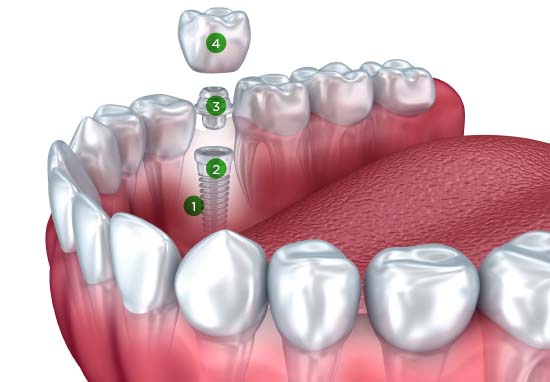Today, dental implants are increasingly being used as an effective alternative to dentures and bridges to replace natural teeth.
Dental benefits
Everything you ever wanted to know about dental implants
The advantages
Implants can be used to replace one tooth or many teeth, or even to support a full denture. Implants are anchored into the jawbone, similar to the natural tooth root it’s replacing. Dentists can place the implant into the socket of the tooth they are extracting or surgically create a space for an implant if a tooth has been missing for some time. A crown is placed on top of the implant and looks and functions like a natural tooth without the worry of decay or the need for root canals. Since the implant functions like a tooth root and a crown or bridge can be fastened directly to it, implants look and feel more natural than a removable denture. This may improve a person's ability to chew, speak and their self-confidence. Implants are highly successful and, although more expensive than a conventional bridge, they may prove to be more economical and long-lasting over a lifetime.
How they work
It takes several sessions over the course of several months to properly install dental implants. The process may involve a number of dental professionals, such as an oral surgeon, periodontist, prosthodontist or general dentist with specific training in implants.
1. Your dentist will extract the unhealthy tooth.
2. After your gums heal and the bony socket fills in for 3-6 months, the dentist will do a second minor surgery. Your dentist will install the artificial root, made from titanium and other body-safe materials into the jawbone where the tooth previously was. If the missing tooth is in an area that shows when you speak or smile, your dentist will likely make a temporary tooth or appliance to wear while you heal.
3. Then, a tiny metal post known as an abutment or a connector, is attached to the artificial root. This piece sticks up above the gums and is what the tooth crown is attached to.
4. In the last step, a crown or a replacement tooth is attached to the connector post.
This series of surgeries can take up to six months, but if you meet certain criteria, the dentist can expedite the process by performing multiple steps in one session. If you've had a previous extraction, the process will be similar.
Are implants for you?
As long as you’re in good health, have healthy gums and enough bone structure to support the implant, you’re probably a good candidate for dental implants. Your dentist will do an assessment to determine if implants are a good fit for you.
Dental benefits for implants vary by plan, so before you seek treatment, be sure to check your plan by logging in at deltadental.com, referring to your plan booklet or contacting Delta Dental.











